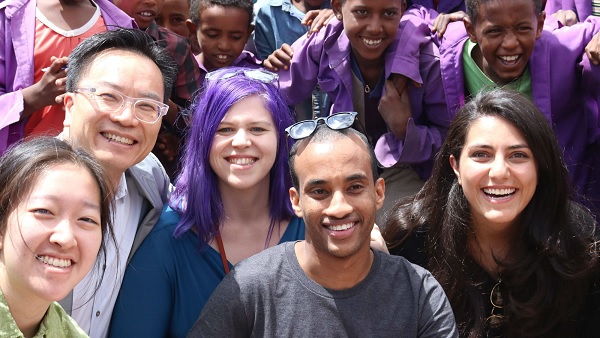
A group of professors and students from the University of Pennsylvania (U Penn) on a four-day trip to Ethiopia, for a close-up look at the African nation’s health, agricultural, business, and political sectors.
PHILADELPHIA, PA (Penn Today)–In the weeks leading up to her arrival in Ethiopia, Shuaiqing Liu read plenty about the transportation challenges in the African nation. She still wasn’t prepared for the sheer scale of the difficulty getting even small distances outside the capital, Addis Ababa, her Wharton Global Modular Course group’s home base during their four-day visit.
“We could have covered 10 activities in one day, and contributed more to the local economy,” says Liu, a first-year MBA student. “Instead, we covered only three. It made me think about how the local people might want to travel to a bank or to get health care and, because of the limitations of the transportation, they can’t.”
That’s exactly the type of impression Penn Integrates Knowledge (PIK) Professor Ezekiel Emanuel, who’s leading the course with Assistant Professor Heather Schofield, wanted the students to get. Both are affiliated with the Perelman School of Medicine and the Wharton School at the University of Pennsylvania.
Emanuel has run the Challenges and Opportunities in Africa: Health Care and Business of Ethiopia course three times in the last four years. He says he’s focused on Ethiopia because it’s very much still a developing country, but one that has made major political and economic changes in the past few years, and has also had success bringing health care to the largely rural population.
The country is twice the size of Texas, with a population of more than 100 million; the birth rate is the 17th highest in the world. Income nationally remains very low—about $1,000 per capita—but things are changing in Ethiopia, Emanuel says. And the nation’s health care outcomes are improving dramatically, even though the country spends far less per capita than the United States.
That’s why the group visited a health extension worker program, local health post, and a hospital in the countryside.
“You have this very rural health post, and you have two women working who’ve just been trained for a year each,” Emanuel says of the visit to the Dobi center. “And they have data up on the walls: How many people got malaria, how many women delivered their baby in a health facility, how many people died in the area which they’re responsible for.
Read the complete story at Penn Today
